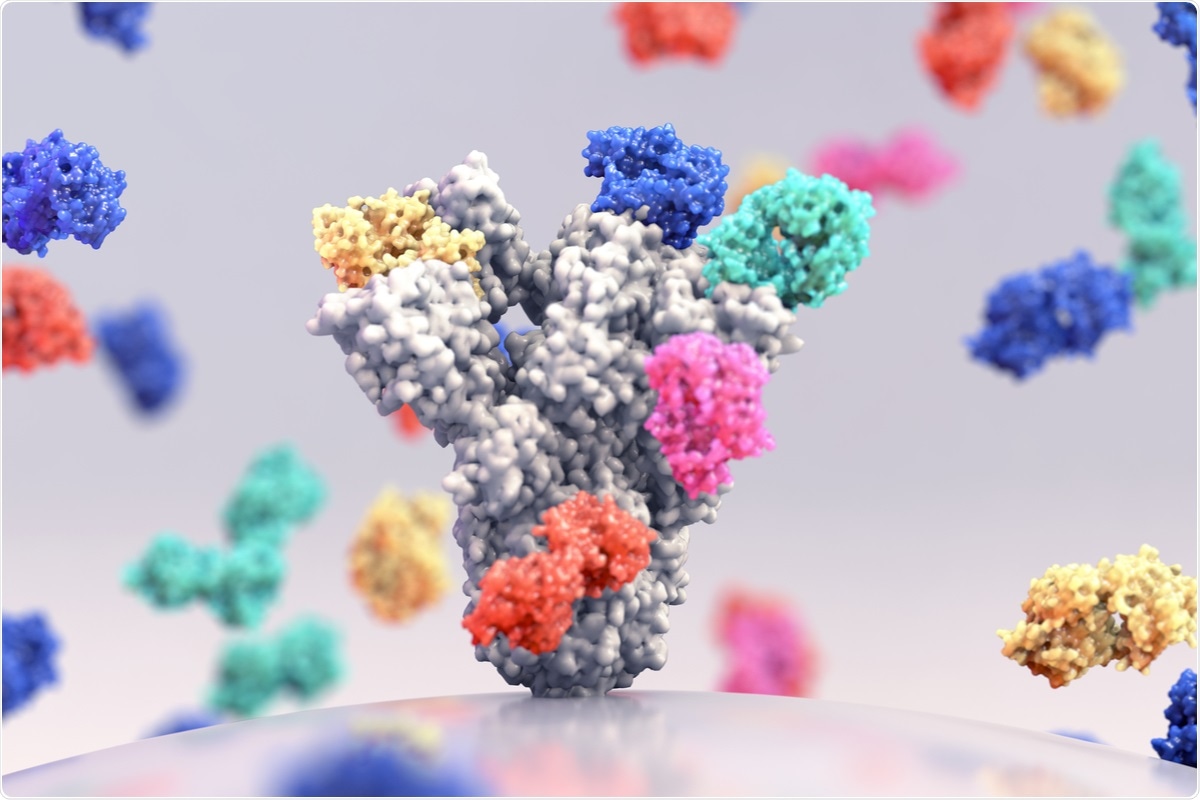During the coronavirus disease 2019 (COVID-19) pandemic, the FDA authorized the emergency use of neutralizing monoclonal antibodies (mAbs) to treat mild to moderate COVID-19 patients at risk of progression to a more severe prognosis. This was done in an attempt to lower the hospitalization and death rates. Some of the most common mAbs used have been bamlanivimab-etesevimab, bamlanivab and casirivimab-imdevimab. The University Medical Centre of Pittsburgh began a study to investigate the comparative efficacy of these antibodies alongside the U.S. Federal Covid-19 Response Team. All three of these mAbs had been authorized for use in patients by the U.S Food and Drug Administration (FDA) and were supplied by the U.S. federal government.
 Study: A Learning Health System Randomized Trial of Monoclonal Antibodies for Covid-19. Image Credit: Design_Cells/ Shutterstock
Study: A Learning Health System Randomized Trial of Monoclonal Antibodies for Covid-19. Image Credit: Design_Cells/ Shutterstock
Any patient with a positive severe acute respiratory syndrome coronavirus 2 (SARS-CoV-2) test result, mild to moderate symptoms for <10 days, and risked progressing to more severe COVID-19 was eligible for mAb treatment. Only patients who required oxygen, were severely underweight or under 12 years of age were excluded. The effectiveness of the three drugs was compared over 28 days, taking into account days spent in the hospital, deaths, and the incidence of adverse events.
A preprint version of the study is available on the medRxiv* server while the article undergoes peer review.
The study
The researchers used a Bayesian cumulative logistic model adjusted for treatment location, age, sex, and time to analyze the results from a population of 'infused' individuals consisting of patients randomly allocated a mAb and treated with their allocated mAB. A total of ~2500 individuals were treated with monoclonal antibody treatment before the trial was brought to an early end as the U.S. Department of Health and Human Services halted distribution of bamlanivimab and bamlanivimab-etesevimab on March/June 2021, respectively, due to evidence suggesting a lack of effectivity. The premature end of the trial is likely the largest factor in the failure of any statistical comparison to meet prespecified criteria for inferiority or equivalence.
Each group of patients treated using the mAbs showed a median of 28 hospital-free days. The likelihoods that bamlanivimab and bamlanivimab-etesevimab were inferior to casirivimab-imdevimab were 91% and 94%, respectively. All patients treated with mAbs showed relatively low mortality rates, with bamlanivimab at 0.8%, bamlanivimab-etesevimab at 0.7%, and casirivimab-imdevimab at 0.7%. Hospitalization rates changed drastically based on the location of treatment.
Those who received the treatment in an outpatient infusion centre showed hospitalization rates at 7.8% (bamlanivimab), 6.5% (bamlanivimab-etesevimab) and 6.9% (casirivimab-imdevimab), while those who received the treatment in an emergency department saw rates of 32% (bamlanivimab), 23.7% (bamlanivimab-etesevimab) and 21.7% (casirivimab-imdevimab). These results are supported by previous studies showing increased rates of transmission in hospitals. Very few adverse reactions were seen, with no patients treated with bamlanivimab having any side effects. 1.4% of patients treated with bamlanivimab-etesevimab had adverse events, and 1.0% of casirirvimab-imdevimab patients – although the casirirvimab-imdevimab did show the highest rates of serious effects.
While none of the tests passed pre-established criteria that would suggest significant effects, the authors argue the design of the statistical analysis allows for continued analysis and quantification of results. In contrast, a more commonly used statistical test would have been immediately rejected following a low p-value that failed to reject a null hypothesis. While this does represent some of the largest gathered data for the use of mAbs to treat patients with COVID-19, the absence of any knowledge regarding the variants suffered by the patients, the risk of patients seeking alternate treatment during the trial, and the early end to the trial for two of the three mAbs likely mean that the conclusions that can be drawn from the data are very limited.
*Important notice
medRxiv publishes preliminary scientific reports that are not peer-reviewed and, therefore, should not be regarded as conclusive, guide clinical practice/health-related behaviour, or treated as established information.
- McCreary E., et al. (2021) A Learning Health System Randomized Trial of Monoclonal Antibodies for Covid-19. medRxiv preprint server. https://doi.org/10.1101/2021.09.03.21262551
Posted in: Medical Science News | Medical Research News | Disease/Infection News
Tags: Antibodies, Antibody, Coronavirus, Coronavirus Disease COVID-19, Drugs, Efficacy, Food, Health and Human Services, Hospital, Monoclonal Antibody, Mortality, Oxygen, Pandemic, Respiratory, SARS, SARS-CoV-2, Severe Acute Respiratory, Severe Acute Respiratory Syndrome, Syndrome

Written by
Sam Hancock
Sam completed his MSci in Genetics at the University of Nottingham in 2019, fuelled initially by an interest in genetic ageing. As part of his degree, he also investigated the role of rnh genes in originless replication in archaea.
Source: Read Full Article
